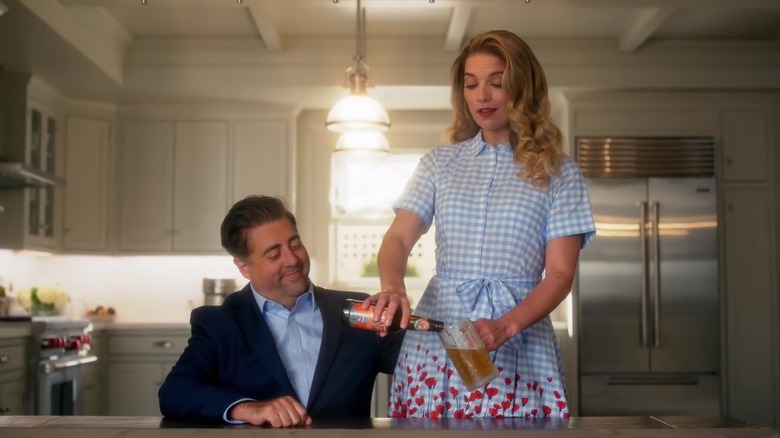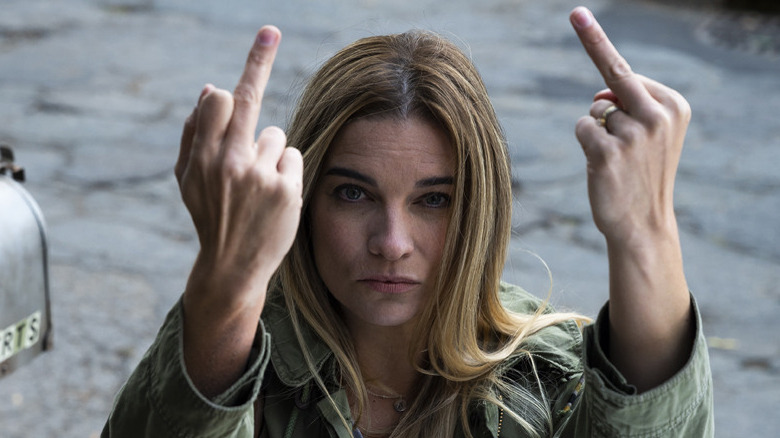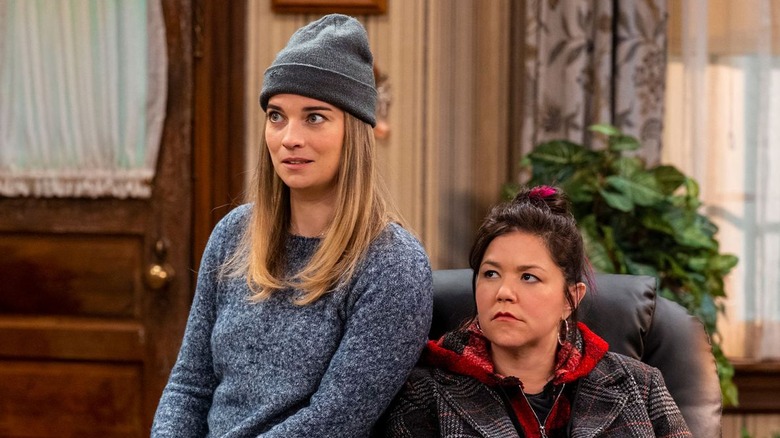Kevin Can F**k Himself Creator Valerie Armstrong On Getting Real About Miserable Sitcom Wives [Interview]
Behind the well-earned strong sentiment in the title, Valerie Armstrong's "Kevin Can F**k Himself" is an extremely thoughtful (and funny) piece of contemporary television. The series takes respectful but incisive aim at the conventions of the old sitcoms of yore, and in particular the archaic trope of the schlubby man-child husband with the gorgeous, oddly subservient wife. Instead, we're presented with a story of female friendship and revenge: Allison McRoberts (an electric Annie Murphy) is stuck in a relationship with her deadbeat idiot husband Kevin (a hilarious Eric Peterson). As her friendship with neighbor Patty O'Connor grows (Mary Hollis Inboden rules here), Allison sees one way out of her predicament: she has to kill Kevin.
It's a hilarious dark comedy that uses the unusual but effective technique of switching from a multi-cam sitcom to a single-cam drama to point to the reality behind the laughs. I spoke with creator Valerie Armstrong to chat its evolution, the intriguing meaning behind it all, and more.
"This woman is miserable!"
I really enjoyed the first season of "Kevin Can F**k Himself." Tell me about the origins of the project and what drew you to create it?
I got the idea for it going on four and a half years ago now, around summer of 2017. I was an assistant, no one was asking me to write anything [...] so this really was for myself. I was listening to this podcast where these two women comedians ... and I reference this a lot, they were talking about pilot season. Every year they're told, "this one's different, they want a really funny woman to play the wife this time. She gets jokes.' They get to the audition, and they get nothing! All of their lines are bad, like 'what do you mean?' and the guys get all the jokes! And I thought 'Jesus! That sucks!' These are women that I'm dying to write for, and they had to audition for these things and then they didn't get them. That's so stupid! ...The format switch just kind of popped into my head there, [where this] wife left her somewhat funny, less attractive husband in this brightly lit living room and this audience laughter, then she runs into the kitchen and its dark and quiet we're like ... this woman is miserable! It's not that we're in a different world, its not that we're in her head, she's the same person we're just looking at her more closely, focusing on her for once. I [thought] 'is that just a scene? Can that be a whole show? [And then I worked on figuring out] what would make me want to stay in that world for years to come.
It's clearly inspired somewhat by Kevin James-style sitcoms, though he's been a great sport about it. How did that get folded in?
Wel l... it had been a really long time, nobody was reading it, I couldn't get them to read it. I was in that phase of my career where I wanted to title things in a way that made me laugh. I just wanted to look at the document and not cringe with imposter syndrome, so all of my working documents I'd find a way to make me laugh. I had a working script for a long time that was called "Imposter Syndrome." This title always made me laugh. I mean it was written around the time that Donna was killed off on "Kevin Can Wait," I was like 'ugh, Kevin can f*** himself.' As time went on I certainly kept that title around because of that, because that was still in my mind. That show's been off the air in so long, but what stuck with me about it is that it does encapsulate the show very well. It obviously never had a [direct] connection to "Kevin Can Wait" ... but it's inspired by that style of comedy. I mean, I loved watching "The King of Queens," I loved it. That's what I was watching! And I still look up the best of Kevin James and "The King of Queens" and they still make me laugh. And I sort of hate myself for it, but I have such a reverence for sitcoms in general. Throughout this entire time working on the show I will always be watching a sitcom as I'm falling asleep or in my spare time, a really great one, just to remind myself that they can be so funny ... it's a tightrope walk, they're incredibly hard to make and make well, and I think that we do our best to make the best one that we can while also highlighting that they can be oppressive.
Can you talk a little more about the idea to shift from the multi-cam world to the darker single cam one?
That's that very first idea of using formats ... I knew that if I wanted to get into what her life was actually like, it would be kind of dark because that's the reality of being that woman. You see posters of comedies like this and you think "really? Why her with him?" And this is the kind of person that gets stuck there. This is the kind of person whose psychology leads her to believe that man is the answer to her problems, but to me ... it's a bit of a dark hell. And the idea of mixing traditional style like that, I mean it also [adds so much to the] metaphor that I thought "is there anything about this that speaks to something larger than just a visual device?" and I thought there are so many things to play with in highlighting the difference between formats. To me the multi-cam is Kevin's benefit of a doubt, so he gets to just have a sort of studio audience following him around ... he's considered a boy at 35, he gets away with so much. None of the jokes that we have to tell are beyond the pale for what would happen in an actual multi-cam. They're exactly what would happen in a multi-cam. The only reason they seem darker is because you know that there are real people behind these things, and that's the difference between the formats.
"We're a show about two women, we're not about an awkward marriage."
How did you approach the multi-cam segments versus the single cam segments?
They're a lot of fun! It was a lot of fun writing this, and [between the multi-cam and single cam shoots] the sets were the same but they'd have to be adjusted over night because it was very hard to shoot on a multi-cam shoot for single camera. I've been on multi-cam sets before, it felt very authentic and we were never doing it at an ironic distance. We really enjoy them, but it was a breath of fresh air to get to the single camera stuff and really make sure we're telling these women's stories.
What's the most difficult part of doing the tone switch and switching from one to the other?
Part of the thing is I've been writing these scripts for so long. The multi-cam has a certain cadence ... you know what a multi-cam should sound like. There shouldn't be a ton going on, it centers around Kevin. And then [by contrast] the single-camera stuff definitely has room for error and there's room for nuance and character building and change. That's where the multi-cam has none. I would say my biggest challenge was kind of in the shooting of it, getting into those multi-cam days ... I've never been a hardened comedy writer, I've never pretended to be. The worlds that I came out of were drama ... I know how that works, but in multi-cam I think I was a little precious about especially shooting our pilot about [what's in it] because ... the first couple days [would be like] "we can beat that joke," and I was like "Excuse me?!" But that's just how the best work and that's how they should work, you should always try to be [better], you shouldn't be precious with it, but it was a really hard lesson for me to learn and I left the first couple days thinking, "I haven't done my job well." I had to really get over that, and I did it [laughs].
How did you get your leads attached?
I feel like I got very lucky! We did not just offer a role to anyone, we, I feel like, read everyone in town for all five regular roles. It was a very, very long process. Annie came to us when she was finally coming up for air after "Schitt's Creek." She had a ton of meetings before she met with us, and I'm so grateful she took a chance on us. She came in, she had her character, she got what we were trying to do, and most of all ... she's very much like us in that we don't want to have a bad vibe ... we all want to do the show with kindness and respect. We said that at our first meeting and it felt like we all go by that mantra. The first time I saw her, she and Mary Hollis had a scene together I was like "that's it! That's it." We're a show about two women, we're not about an awkward marriage ... we just got so lucky. Everyone comes with their absolute A-game every time, and treat each other really well.
"Kevin Can F**k Himself" is available on AMC, and its first season is now available on Blu-ray.


